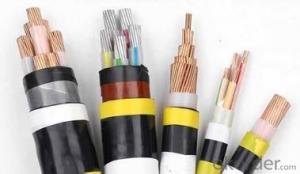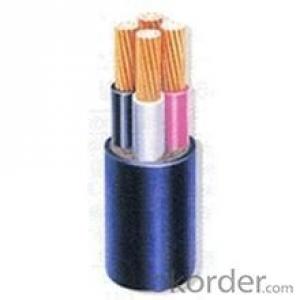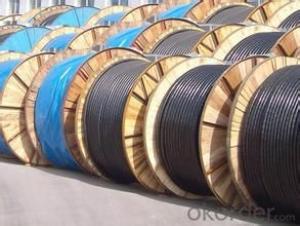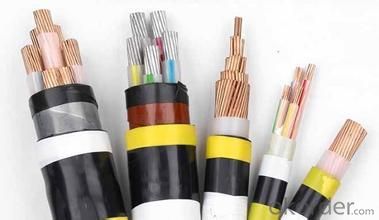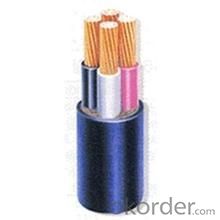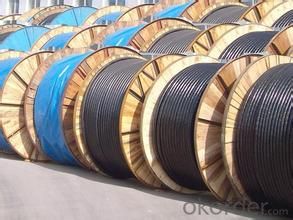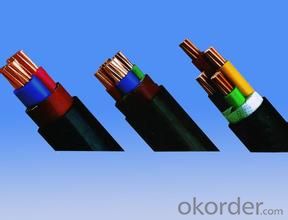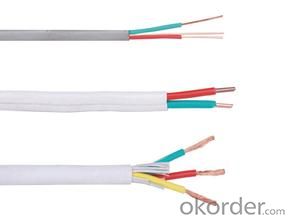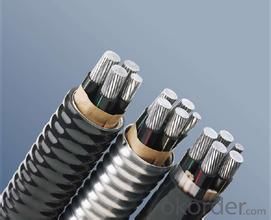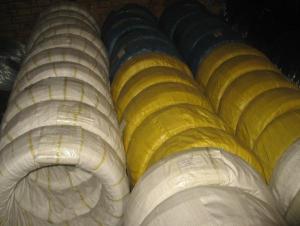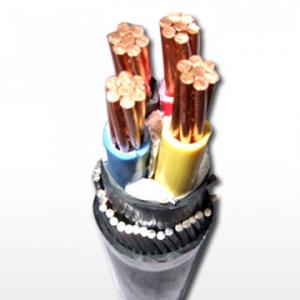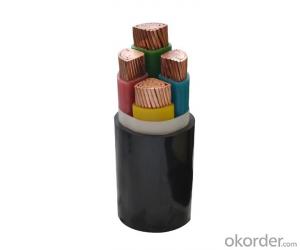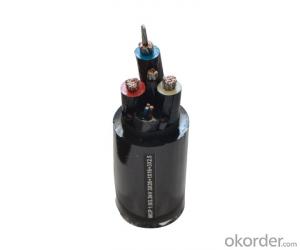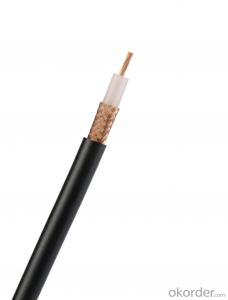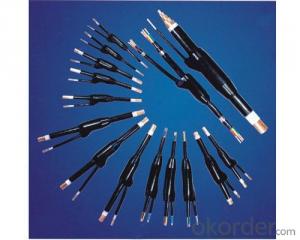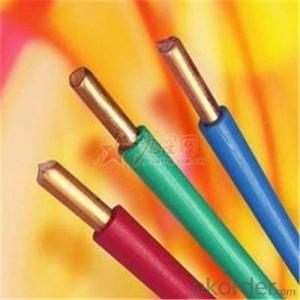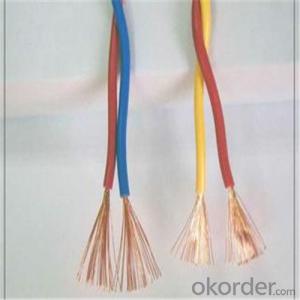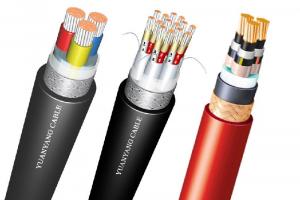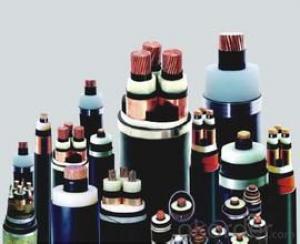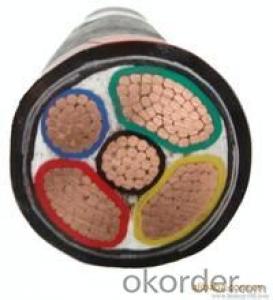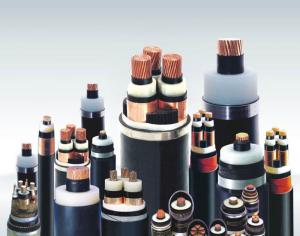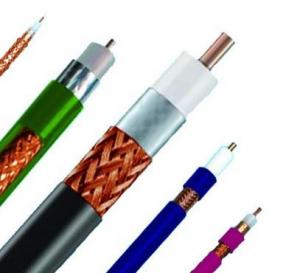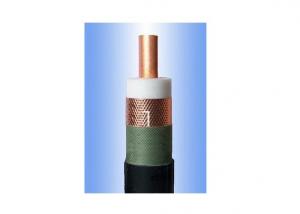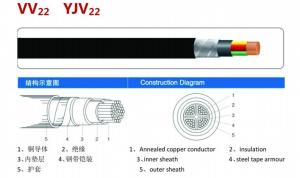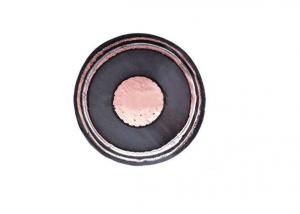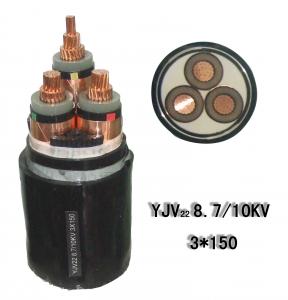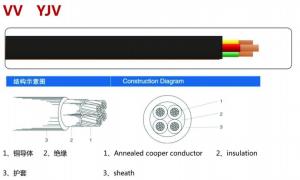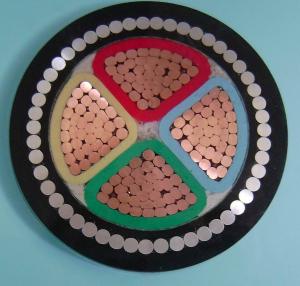LV PVC electric power cables different types of electrical cables for Copper
- Loading Port:
- China main port
- Payment Terms:
- TT OR LC
- Min Order Qty:
- 1000 m
- Supply Capability:
- 20000 m/month
OKorder Service Pledge
OKorder Financial Service
You Might Also Like
Specifications
Different types of electrical cables
1.IEC standard Made in China
2. factory price distributor
3, 12 years produce experience
HV/MV/LV PVC/ XLPE/ Copper/aluminum
Armoured/unarmored electric power cables
Different types of electrical cables
Operational performance
1.installation temperature:≥0°C
2. long-term permissible operation temperature≤90°C
3.Under the condition of short circuit (the max. continuing time should not exceeding 5 seconds) the max. operation temperature:250°C
4.minimum bending radius:
single-core cable: 20D, mm
multicore cable: 15D, mm
Note: D means the actual outer diameter of cables
5. Suitable areas :
Direct burial in the ground and the capacity of bearing certain mechanical force, not proper in the pipeline
6.Main electrical characteristics
different types of electrical cables
Main electrical characteristics
The type, Name, Suitable areas
different types of electrical cables
Type |
Name |
Suitable areas | |
Copper-conductor |
AL-conductor | ||
YJV | YJLV | XLPE-insulated cable sheathed with PVC | Indoor, tunnel, cable channel |
YJY | YJLY | XLPE-insulated cable sheathed with polythene | |
YJV22 | YJLV22 | XLPE-insulated cable sheathed with PVC and armored with steel tape | Direct burial in the ground and the capacity of bearing certain mechanical force, not proper in the pipeline |
YJV23 | YJLV23 | XLPE-insulated cable sheathed with polythene and armored with steel tape | |
YJV32 | YJLV32 | XLPE-insulated cable sheathed with PVC and armored with thin steel wire | The bed of river and shallow sea, as the link line between the two platforms of oil and gas station in the water, the capacity of bearing tensile force. |
YJV33 | YJLV33 | XLPE-insulated cable sheathed with polythene and armored with thin steel wire | |
YJV42 | YJLV42 |
XLPE-insulated cable sheathed with PVC and armored with thick steel wire | |
YJV43 | YJLV43 |
XLPE-insulated cable sheathed with polythene and armored with thick steel wire | |
Conductor | Compact Stranded Copper Conductor, Class 2 as per IEC 60228 |
Circular solid Copper Conductor, Class 1 as per IEC 60228 | |
Flexible Stranded Copper Conductor, Class 5 as per IEC 60228 | |
Conductor Screen | Semi-conductor (MV only) |
Insulation | XLPE(Cross-linked polyethylene) |
Insulation Screen | Semi-conductor (MV only) |
Separate Screen | Copper Tape (MV must, LV optional) |
Filler | PP Yarn, or Paper |
Wrapping Tape | PP |
Inner Covering | Extruded PVC (MV only) |
Armour | Steel Wire, or Steel Tape, or Aluminium Tape or unarmored |
Overall Sheath | PVC or PE |
- Q: I need a power cable for an XBox 360. where can i buy one?
- Best Buy, EB Games (possibly), Future Shop, Circuit City.
- Q: Hi! I want to buy I new Hard Drive but I've got a problem. I have the IDE conector but I don't have the Power Cable. It is connected to my Video Card. Can I add a new one? Can I use a power cable from a optical drive(CD/DVD)? Thanks!
- All you need to do is pop down to your local computer store and get a power splitter, just make sure you get the right type, IDE and SATA drives have a different kind of power connector, so just make 100% sure before you buy!
- Q: Does the ps4 and ps3 have the same power cable?
- Yes it does Adding to that, you need a TV with an hdmi port Also, the power cable doesn#x27;t come with a brick like the Xbox one does
- Q: I just bought a new video card and it requires a power supply and i have the cables but im lost on where to put them.
- You use an open power plug from the power supply. If there isn't an extra one, you need a splitter.
- Q: If I buy a PS3 in the US and bring it back to France, if I buy the french power cable and exchange it with the US power cable, will the PS3 work? I have a transformer which I already use for my Wii so if the power cable doesnt work for the PS3, I can just use the transformer.
- Your PS3 will work anywhere in the world because they all have the same PSU.....you just need the right wall socket connection. So use an adapter or get a new cable for whatever country you happen to be in. PS3 games are all region free so you can play any game from anywhere.
- Q: Hey y'all , so I got this LG X120 Netbook thing and although it works fine when power supply cable is connected, it won't play just by getting supply from its own battery..also i tried starting it up with the power cable on, and after a few moments I unplugged it, and the screen went black-I mean the netbook was turned off by itself..any help with that? thanks
- It sounds like the problem is one of three things. Either the power cable is the wrong voltage/amperage (these should be labeled on both the charger and the bottom of the laptop and/or battery) If the charger specs don't match the battery specs, it can cause this to happen. Maybe there was a mess-up that caused your to receive the wrong charger. The second possibility is that the battery is bad. A third possibility may be the connection from the battery to the laptop. It may not be making a good connection or could have some internal circuit problems. In any case, if the laptop is still under warranty... I would try returning it. Even if the problem can be fixed from the above suggestions, a problem like this early on tends to be bad news of what lies ahead.
- Q: I just bought an electric guitar and an Ibanez Ibz10g 10 watt amplifier. I read the reviews for the amp and someone said it only comes with the power cable.1. Is this true?2. If so will I be able to play with just a power cable or do I have to buy other cables separately?This is probably a stupid question but I seriously have no idea what cables are required for electric guitar. I ordered it from OKorder yesterday and couldn't find any details about what it comes with.
- The term power cable is used on electrical appliances such as amplifiers. Some amps have permanent fixed ones while others are detachable. A guitar uses what is called a 1/4 inch instrument (or guitar) cable to connect to a guitar amp. These are properly shielded cables. They either have two straight jack plugs or one straight and one angled - both works fine. A length of 6' seems to suit most situations. These cables come in lots of qualities, from very poor to high quality. You do not need the most expensive ones, just don't get the cheapest qualities. If it's a guitar pack you have purchased, guitar and amp together, it may be that there's a guitar cable included. These are typically very low quality... basically throw away stuff. You hook up the guitar by inserting one end of the cable into the guitar output jack and the other end of the cable into the amplifier input jack - usually found on the front of the amp, labelled 'Input'. And no, it is not a stupid question - we all have to start somewhere! Good luck with your playing :-)
- Q: Can someone tell me if the computer descibed below would have a plug for a 6-pin PCI Express supplementary power connector?Intel G33 Chipset Supporting Core 2 Quad and Core 2 ExtremeFull HD 1080P video output4 DDR2 DIMM slots (Supports up to 8GB)Dual Channel Memory SupportFour SATA II SlotsSupports SATA RAID 1 (Mirroring)One PCI Express x16 - One PCI Express x1 - Two PCIIntegrated Intel HD Audio and Ethernet (LAN)Eight USB 2.0 (4 front, 4 rear)
- The 6 pin power cable will not come from the motherboard. It will come from the power supply unit into the card. Check your PSU has one before you buy the card. You may need to buy a new PSU but most of them do have it.
- Q: I am missing pin 20 for my ATX motherboard power connector (which is normal). But I am also missing pinouts and a few wires from other connectors like PCI-e, Peripheral connectors, and even SATA connectors. But here is the thing, all the missing pinouts go INTO the POWER SUPPLY? So are all these intentional, or is it a flaw? Thanks!
- Handycam Camcorders do no longer draw potential from USB. you will possibly desire to purchase a alternative potential furnish cable. in case you're taking the camcorder to a place like terrific purchase or Radio Shack, you are able to possibly get a clean cable for little or no money (notwithstanding it is not extremely the valid Sony cable).
- Q: Sometimes I have to jiggle the chord or plug it in the right position to get the laptop to be charged. At first, I thought it was the power cable, but after buying a new one, I still have the same problem. Any suggestions as to what causes this and how to fix it?
- the only element you do no longer point out is that if the output is AC or DC. If the connectors are the comparable length, as a ways because of the fact the specs pass, evidently like it is going to paintings. How do you tell if this is AC or DC? Many capability adapters in simple terms say it (AC/DC) with the output archives. If yours does, you in trouble-free terms did no longer positioned it on your post. If it would not say, you should seek for a logo. the logo for DC is 3 dots with a good line section over the three dots. For AC you get a tilde (wave image) over the three dots. The pc furnish is definitely is DC. as long because of the fact the different is DC additionally, then pass forward. in case you do no longer see any image, you may desire to obtain a digital meter which will inform you for helpful. good luck.
Send your message to us
LV PVC electric power cables different types of electrical cables for Copper
- Loading Port:
- China main port
- Payment Terms:
- TT OR LC
- Min Order Qty:
- 1000 m
- Supply Capability:
- 20000 m/month
OKorder Service Pledge
OKorder Financial Service
Similar products
Hot products
Hot Searches
Related keywords
